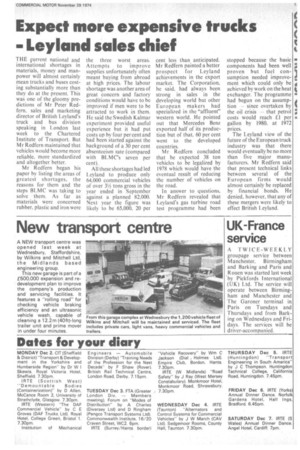Expect more expensive trucks Leyland sales chief
Page 19

If you've noticed an error in this article please click here to report it so we can fix it.
THE .current national and international shortages in materials, money and manpower will almost certainly mean trucks and buses costing substantially more than they do at the present. This was one of the gloomy predictions of Mr Peter Redfern, sales and marketing director of British Leyland's truck and bus division speaking in London last week to the Chartered Institute of Transport. But Mr Redfern maintained that vehicles would become more reliable, more standardized and altogether better,
Mr Redfern began his paper by listing the areas of greatest shortages, the reasons for them and the steps BLMC was taking to solve them. As far as materials were concerned rubber. plastic and iron were the three worst areas. Attempts to improve supplies unfortunately often meant buying from abroad at high prices. The labour shortage was another area of great concern and factory conditions would have to be improved if men were to be attracted to work in them. He said the Swedish Kalmar experiment provided useful experience but it had put costs up by four per cent and had been started against the background of a 30 per cent absenteeism rate (compared with BL MC's seven per cent).
All these shortages had led Leyland to produce only 64,000 commercial vehicles of over 31/7 tons gross in the year ended in September against a planned 82,000. Next year the figure was likely to he 65,000, 20 per
cent less than anticipated. Mr Redfern painted a better prospect for Leyland achievements in the export market. The Corporation, he said, had always been strong in sales in the developing world hut other European makers had specialized in the "affluent" western world, He pointed out that Mercedes Benz exported half of its production hut of that, 60 per cent went to the developed countries, Mr Redfern concluded that he expected 38 ton vehicles to be legalized by 1978 which would have the eventual result of reducing the number of vehicles on the road.
In answer to questions, Mr Redfern revealed that Leyland's gas turbine road test programme had been stopped because the basic components had been well proven hut fuel consumption needed improvement which could only be achieved by work on the heat exchanger. The programme had begun on the assumption since overtaken by the oil crisis -that petrol costs would reach £1 per gallon by 1980, at 1972 prices.
The Leyland view of the future of the European truck industry was that there would eventually he no more than five major manufacturers. Mr Redfern said that present technical links between several of the European firms would almost certainly be replaced by financial bonds. He denied, however, that any of these mergers were likely to effect British Leyland.




























































































